#yeah- not ashamed to say I’m still into watching old western tv shows
Text
I was also sensing something last night (couldn’t figure out what it was)- only to find out that an older actor I used to watch more of, died.
At least it wasn’t what my overactive mind was thinking.
#may his memory be a blessing#he was in that Hunters episode of Little House on the Prairie#yeah- not ashamed to say I’m still into watching old western tv shows
2 notes
·
View notes
Text
2017 Movie Odyssey for-fun awards
The 2017 Movie Odyssey Awards are being posted sometime soon, but, as is tradition on this blog, here are some for-fun honors and dishonors based on a year of watching 200+ films that were new to me this calendar year.
Actor I wanted to smack most in the face: Mark Wahlberg, The Happening (2008)
Good lord, he was AWFUL. “Planning on murdering me in my sleep?” “WHAT, NO!” Here’s Wahlberg talking to a plastic tree.
Attempted political messaging, but says less than it wants: State of the Union (1948)
Frank Capra, you are better than this!
Attempted religious messaging, but says less than it wants: Conflagration (1958, Japan)
Best Film Title: What Dreams May Come (1998)
Best individual cue from an original score: “End Titles” from Independence Day (1996), composed by David Arnold
Best lyrics passage from an original song: From “No Wrong Way Home” from Pearl (2016 short)
One blue-green world, round as a pearl,
doesn’t matter which road you take, you’ll wind up in the same place.
That’s not philosophy, it’s geometry,
and if things don’t look the same, well it’s only you who’ve changed.
There’s some interesting messaging and rhyming going on here. Damn.
Best Moment: An act of sportsmanship, followed by a grandstand finish, Akeelah and the Bee (2006)
If you have kids and they haven’t seen this movie, find this movie. If you haven’t seen this movie, find this movie.
Best Montage: Body-switching and “Zenzenzense”, Your Name (2016, Japan)
Best Movie Dad: Raymond from My Life as a Zucchini (2016, Switzerland)
The first non-biological father to win here, I think. It matters not, though. He is wonderful here.
Best Movie Family Member, non-parent: Aunt Mattie (Clara Blandick), A Star Is Born (1937)
For supporting Esther’s dreams of going to Hollywood without fail. You go, Aunt Mattie. She really is not in this movie long enough.
Best Movie Mom(s): All of the Boatwrights (Queen Latifah, Alicia Keys, and Sophie Okonedo) and Rosaleen (Jennifer Hudson), The Secret Life of Bees (2008)
Again, a first in that these are adopted parents. Thanks to a good friend of mine for introducing to me the book.
Best on-screen friendship: The friendship between all the orphans in My Life as as Zucchini
Best use of non-original music (and best musical callback to a past movie): The many uses of “You’ll Never Know” from Hello Frisco Hello (1943) appearing in The Shape of Water (2017)
Hello Frisco Hello remains on my watchlist… we’ll get there someday!
Best dance segment (for two): Rita Hayworth and Fred Astaire in “I’m Old Fashioned”, You Were Never Lovelier (1942)
Best dance segment (solo): Donald O’Connor in “A Man Chases a Girl (Until She Catches Him)”, There’s No Business Like Show Business (1954)
Best sword fight: Errol Flynn v. Basil Rathbone, Captain Blood (1935)
Yeah, sorry folks who expected Rey and Kylo Ren v. Praetorian Guards or Kylo Ren v. Luke here.
Bestiality: The Red Turtle (2016, France/Belgium/Japan)
SPOILERS!!!
Biggest Disappointment: Marnie (1964)
Oh god, this may be the first Hitchcock movie I truly loathed (nor do I think it will be the last… I’ve basically seen all the greats by now).
Biggest (pleasant) surprise: Pear Cider and Cigarettes (2016 short)
I was worried about the explicit content for this Oscar-nominated short film, and that it might meander around its topic a bit. But no it didn’t. Well done, well deserved nomination.
Biggest (unpleasant) surprise: Detroit (2017)
It becomes torture porn in the final third. The black victims are not nearly developed enough here as they should be.
Bloodbath: Logan (2017)
Is it the movie with the highest body count? Maybe not, considering I saw both Independence Day movies this year. But it was certainly bloody!
Bravest: Parvana, The Breadwinner (2017)
Going full-out Mulan to help her family survive in pre-American invasion Afghanistan? I was astounded by Parvana’s resilience.
Don’t take opiates, kids: Pink Floyd - The Wall (1982)
Greatest Discovery (Actor): Pierre Étaix, Yoyo (1965, France)
Greatest Discovery (Actress): Brooklynn Prince, The Florida Project (2017)
Greatest Discovery (Director): D.A. Pennebaker, Don’t Look Back (1967) and Monterey Pop (1968)
Hardest ending to watch: The Coward (1965, India)
Satyajit Ray pulling no punches here.
Hypnotic: Notes on a Triangle (1966 short)
A beautiful experimental animated short film. Someone’s going to connect it to the Illuminati or some vast Canadian conspiracy somehow.
Kept me on the edge of my seat: Seven Days to Noon (1950)
A Cold War thriller at the very beginning of the Cold War has so much going for it than so many modern thrillers can never hope to achieve.
Kick-ass moment: This riding scene from The Man from Snowy River (1982)
I’d like to see a chimpanzee with dual-wielding machine guns do that! Make it happen, 20th Century Fox!
Laziest (not worst) film title: Summer Magic (1963)
I mean, the songs are decent and Hayley Mills is, too. But come on, Disney!
Least funny comedy: That Funny Feeling (1965)
Least likely to deserve my negative review 10 years from now: Justice League (2017)
Because you know Zack Snyder will find a way to screw the DCEU up even more.
Least likely to deserve my positive review 10 years from now: I have a hunch it’s gonna be Star Wars: The Last Jedi (2017)… but I don’t want that to be official here.
Line I will repeat the most down the years: “Apes. Together. Strong.”, Dawn of the Planet of the Apes (2014) and War for the Planet of the Apes (2017)
Made fashion designers compelling: Funny Face (1957)
Most Inspiring: Swim Team (2016)
A documentary that follows three members of a New Jersey Special Olympics swim team. All those kids have autism, and it is fantastic to see them learn, grow, and live over time. It isn’t a Hoop Dreams, but it doesn’t need to be.
Made me laugh the most: Blackbeard’s Ghost (1968)
And I’m not ashamed to say that. It’s not the best comedy by any means, but I got more laughter and mileage out of this one than anything else.
Most Memorable Use of an Icepick: Scarlet Street (1945)
Don’t spoil if you know!
Most Overrated Picture: Manchester by the Sea (2016)
Casey Affleck had no business winning that Academy Award.
Most Underappreciated: The Great Man (1956)
In our world of “fake news”, this movie - which also comments on how we idealize our heroes - has many echoes on today. It’s a good journalism/news media movie, even if it’s concentrated on early TV and especially radio.
Most Underseen: Bardelys the Magnificent (1926)
A good, entertaining adventure-romance silent film with John Gilbert and Eleanor Boardman. The reason why it’s underseen was because it was considered a lost film until recently, when a near-complete print turned up in France.
Movie I most wished to write on, but wasn’t able to (because I ran out of October to do it): A retrospective on Rise of the Planet of the Apes (2011) and regular reviews for Dawn of the Planet of the Apes (2014) and War for the Planet of the Apes (2017)
Movie that I’m most eager to rewatch: Castle in the Sky (1986, Japan)
There was so much going on, and so many departures from Nausicaa that I need time to do a Retrospective review on this some day. It’s a gorgeous film.
Nearly resulted in someone killing me in a theater: In This Corner of the World (2016, Japan)
Yeah, if the main character had gone to Hiroshima, I would have been a goner (and it wouldn’t have been by my own hand).
Raunchiest: Destry Rides Again (1939)
Holy hell. There are so many entendres in here, and Marlene Dietrich is going all out on the sexuality! How did this get pass the Hays Code?
Sorry, I didn’t get it, and I still don’t get all the love for David Lynch (even though Mulholland was great): Eraserhead (1977)
Sounds most like a porno (other than Octopussy because that’s too easy): Peeping Tom (1960)
With apologies to Michael Powell.
Star Trek alumni award: Patrick Stewart, Logan (2017)
Surprisingly relevant political commentary: They Won’t Forget (1937)
Northern-Southern attitudes in the United States? Even a touch of racial relations? Now if only Warner Bros. kept the defendant in the movie Jewish, as he was in real life.
Underrated: Lonely Are the Brave (1962)
One of the best neo-Westerns you are likely to see.
Worst film title: The Hound That Thought He Was a Raccoon (1960)
For chrissakes, Disney.
Worst Moment: All the rapey-ness of Revenge of the Nerds (1984)
It reminded me why the 1980s is in contention for my least favorite decade of filmmaking.
Stay tuned, the 2017 Movie Odyssey Awards will be up shortly! Thank you all for following. Thank you all for being here for as long as you have. Thank you for supporting all this blog does.
6 notes
·
View notes
Text
The Incredible, Radical Jessica James
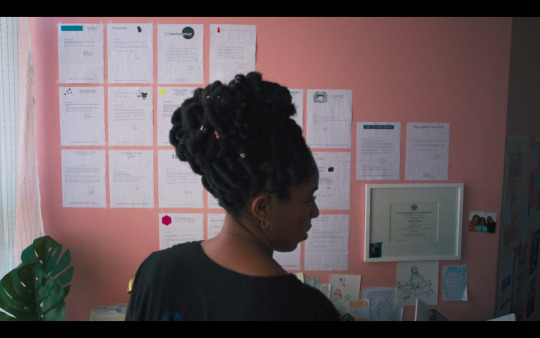
• • • [spoilers below] • • •
In the middle of a blind date she doesn’t particularly want to be on, The Incredible Jessica James’ eponymous heroine squares off with her equally uncomfortable, male dinner friend/potential boyf/adversary.
They volley back and forth several brutally, “completely honest” questions.
After a few, he asks her, “How do you pay your rent?”
“I… work at a non-profit, in Hell’s Kitchen.” (Pride in her voice, though a somewhat knowing tone: yeah, I know. Very Brooklyn answer.) “I teach public school kids how to write and produce their own plays.”
“So… how do you pay your rent?”
She laughs.
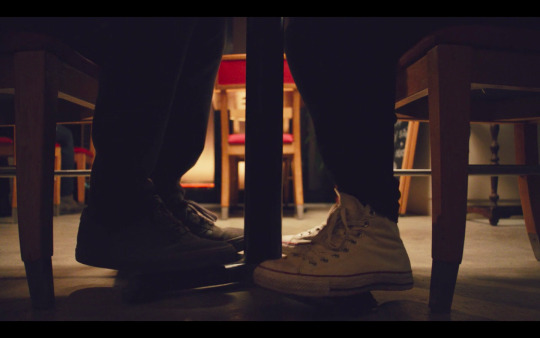
Already – my Netflix ticker says this is barely 13:50 into the entire movie – the two biggest threads of the film come together: (1) an endearing, realistic romantic comedy starring Jessica Williams (that Dope Queen off The Daily Show who now does other stuff – namely, this) and rom-com’s staple dorky everyman Chris O’Dowd (because the thinking, even semi-straight woman[**] needs an IT guy); and (2) the female Bildungsroman.
If you’ve taken an English class any time since approx. 1980, you’ve probably had to learn and use “Bildungsroman” in an essay. It’s the coming-of-age novel, the story of growing up, an arc from innocence to experience. Except, as a pivotal cohort of feminist critics in the 1980s argued, the female Bildungsroman means “growing down,” a story of women being taught by society: Lower Your Expectations! Conform! Settle! The debate around what even is a Bildungsroman has wrestled with how gender-specific a story about maturing and (in essence) #adulting can be, given that women in Western society since the inception of the novel itself haven’t really had the options to leave home, discover themselves as autonomous, free, independent selves. The male Bildungsroman, in other words, is about the boy who grows up to be a man, and gets a job; the female Bildungsroman is about the girl who becomes a lady, and finds the right husband. Sure, there’s status and some freedom attached to that – class status and thus economic freedom, as the bourgieness of the novel excels at rewarding. But by and large, no matter how failed the male career, no matter how much the woman takes on a new career of domestic labor, the novels usually emphasize along these lines. Men achieve professional success; women aren’t left to be spinsters.
(A professor in my department, Jesse Rosenthal, pointed out how pervasive this narrative still is within even the most indie, “unconventional” of tales. His case study? (500) Days of Summer. As he recounted to a class on the 19th-cen. British novel, here’s a movie putatively about the romantic maturation of the male subject – a rom-com trajectory usually reserved for women [i.e.. He’s Just Not That Into You could never be She’s Just Not That Into You]. But Joseph Gordon Levitt’s problematic-nice-guy fairy tale, complete with problematic-indie-dream-girl Zooey Deschanel, isn’t his acceptance of a limited role in his next relationship. It’s a successful job interview. [roll credits])

So the fact that The Incredible Jessica James coupled, in several senses, these two plots wasn’t surprising to me. Less than 15 minutes in, and yeah, obviously, Chris O’Dowd is gonna get the girl, and Jessica is gonna get over her ex by realizing that she “deserves” this more mature guy. Her work is great and all, the story goes, but obviously what we want is Bridesmaids with a lady of color. Comedy + late capitalism’s precarity (Jessica, how do you pay your rent? Are you going to have to go live with your parents like Kristin Wiig had to after the cupcake biz tanked?) = love story. And bonus points for being about Instagram, and having a WOC lead where a white actress would have been five or ten years ago (slash even now): kudos, my friends. Kudos.
But… that’s not what happened. And here’s where this movie is radical.
Because The Incredible Jessica James is a female Bildungsroman [or Bildungs-Film] that subtly, cannily, definitively breaks the mold.
It isn’t a story about a woman realizing how wrong she is to be hung up on the wrong, bad boy, and thus the return to the family, to society’s right side of the tracks, to *herself* that is made whole again by giving up her rebellious adolescent wandering and waffling. Instead, TIJJ presents a heroine who goes through a series of rejections not of lovers, but of jobs [displayed on her wall: see first screencap]. It tracks her indefatigable efforts to make what she loves (theater) into a career, even a somewhat uncertain one. It’s about her slow realization – not the sudden “awakening” narrative that critics have ascribed to female/feminist Bildungsroman of old – that what she’s doing, working every day with kids, continuing to send out her resume, writing and reading and connecting with the public circles of her aspiring field – all that, is a career.
Take, for example, a crucial marker of James’s acceptance of herself, and of her status, as grown-up, matured, sufficiently adult that she’s no longer faking it til she makes it: she’s Made It. The blueish-purple jumpsuit spotted in a Brooklyn consignment shop, the kind that is explicitly labeled as male by the sewn patch of its previous owner, “Randolph,” tall enough for even the pretty tall JJ.

Working-class, second hand, male-identified uniform; natural hair in box braids; red lipstick and bright eyeliner. This is how Jessica meets her parents. But the music slides to an uncomfortable stop as Jessica gets off the Arrivals moving walkway: her parents are bourgie, sweet, stable, and utterly unlike her in spirit. This is the American middle-class dream – as authors from Frantz Fanon to Paul Gilroy to Ta Nehisi-Coates have written – that preys on Black people specifically, the double-consciousness of passing as it works in all its formulaic vapidity. Jessica’s younger sister, too, has bought into this dream: she takes one look at Jessica.
“You look like an auto-mechanic,” Jerusa (her sister) points out in a tone dripping with judgment.
“It’s cool, though, right?” Jessica beams.
“Yeah…” her sister nods, meaning the opposite. “I mean, you’re not going to wear it to the party?” [Her very normative, unironic, and uncritical baby shower.]
“… Nope,” Jessica deflates. Pretending this has been her plan all along.
Because this family isn’t ever going to be the place where Jessica can be anything other than stifled. The prim-and-proper group sits in the suburban family room late that night, merrily gooey-eyed over a romantic drama they’re watching on TV, whose dialogue (that’s all we overhear) is so utterly, sickeningly banal that Jessica doesn’t even enter the room. She hangs back, in the darkness. The entire setting – with all its race and class implications (and the sincere and moving subplot about the James family’s struggles with making their own rent, and how this continues to the present with Jessica’s public school kid whose divorced parents are fighting over custody, intertwines class and race throughout) – requires, in sum, the painful subjugation of Jessica’s self. A “growing down,” a compromise, as its definition of “growing up.”
Women of traditional Bildungsromane, Abel, Hirsch and Langland posit, “are not free to explore; more frequently, they merely exchange one domestic sphere for another. While the young hero roams through the city, the young heroine strolls down the country lane” (8).
Jessica James, by contrast, goes back to New York.
And back, at least superficially, to the romantic sphere of this rom-com. Where her jumpsuit is acceptable; where people like her appreciate thoughtful, empowering arts (instead of, like her mom’s Very White Book Club Lady friend wants, Cats). Where her lesbian best friend (that actress from Master of None) is the elective community James wants, not the family she’s contractually obliged to recognize in her blood. Where Chris O’Dowd is; where her career is.
So how does the movie wrap up the romantic plot without making this about Jessica’s successful “deserving” of the Right Man™?
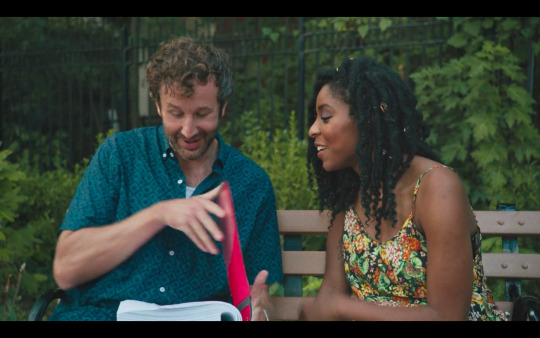
(It’s worth noting, before we spoil the ending, that the Boone – aka O’Dowd – subplot of the movie focuses on his not being able to get over the right girl. He stalks his ex-wife, amusingly because it’s Chris O’Dowd, but I think the movie implies cringe-worthily and creepily too: the dude side of rom-coms, it seems, is bleak; not somewhere the film is especially interested in lingering, and neither really are we. He’s eventually ashamed of himself, and this humility is deliberately more endearing than his Every Breath You Take enactment was. Admittedly, we could get into the politics of who says they’re sorry at various points in the film, who asks for and who gives forgiveness, and the ways in which being placed in a position of forgiving is, in a way, simultaneously powerful and powerless. But Nietzsche and feminism is a debate for another time.)
What I’m especially struck by – and I’ve watched this movie myself and with my sister, and then thought about it again after it was praised by another woman I love who watched it an ocean away – is that TIJJ ends with Jessica.
The final two scenes are crucial here. The penultimate brings together the two guys; formally, the two choices of a Bildungsroman: forward, or back? Jessica’s ex, Damon, finds her backstage after the kids’ theater night concludes, and opens with how he “know[s] how much this means to” her. For a split second, I panicked: OH GOD, fuck, this is why we can’t have nice things. They’re gonna have this guy realize how great she is – because obviously the only way a guy can appreciate a woman is for him to be in competition with another man. She deserves better! I shouted internally. Don’t take him back: sure, you realized you were as responsible for the break-up as he was. So what! You can do better.
But they hug, they sigh, and he leaves. (At which point I breathed a sigh of relief.)
Enter Chris O’Dowd. (At which point I was back to, fuck conventionality. What a missed opportunity.)
Turns out, though, the movie saw me – and the Bildungsroman – coming a mile off.
Because Jessica – unlike Rachel – gets on the damn plane.
Jessica, after all, has been offered a huge job opportunity in the most novelistic of cities: London. But things are just getting back on track with Right Guy; but going is her dream, is her big break; but he, like Damon, just realized how great she is – he read her entire corpus of theatrical writing, and declared – #honesty – that he’s still coming to grips with her complexity, on the page and off; but; but; but…
But… she forgot to tell him about London. And in a sense, this is where swelling crescendos of orchestral joy began filling my head, because if this had been a rom-com like the others, if this had been a female coming-of-age story like the others, she would never forgotten about him. Ever. Not once. He would have been her one phone call; her best friend-par-excellence; her Person. Instead, that honor goes to Tasha, the semi-parodic self-involved best friend who always, though, has Jessica’s back.
And so when the clearly wealthy – loaded, because of an app that is explicitly about the formal gesture afforded by technology of Family, without the actual emotional or affective labor of having to talk to those totally different people who somehow raised you! – Boone mentions “frequent flyer miles,” we can anticipate an airplane that Jessica (by now we can say, of course) will be on.
“Just if you wanted to… bring someone with you… to show you around the town,” he hedges, just before the cut.
“How does that work? [...] Frequent flyer miles?”
Cut to Jessica – in the god. damn. JUMPSUIT. Pleased as punch, sitting in – oh yes, we can have nice things – not even economy seats. The nice seats.

At which point, the truly INCREDIBLE part of this movie becomes clear:
Tasha: Dude, I can't believe your boyfriend bought us tickets to London.
Jessica: Okay, who said anything about him being my boyfriend?
T: Wait. What are you talking about? This is like, the most romantic gesture I have ever seen.
JJ: Yeah, it's dope. But it takes more than a couple of roundtrip tickets to London for somebody to be my boyf.
T: That is so boss.
Shandra – the elementary school girl whose divorced parents prompted Jessica’s own reflection on her parents/childhood – returning to her seat: What is so boss?
T: Uh, Jessica.
S: Oh, yeah. Duh.[… I]t was really cool of your boyfriend to get me a ticket, too.
T: Hey, whoa, whoa, whoa. Sister. Just because a guy buys a lady a couple of roundtrip tickets to London does not make him her boyfriend.…
[a beat]
S: You know, I like your jumpsuit.
JJ: Thank you. Yeah, it's pretty bad-ass, right?
S: Hm. Yeah, it is.
They all exchange smiles, the camera zooms in for one final-close up of Jessica’s excited anticipation of landing for the beginning of – not her romance, but – her career.
COME ON! You’re telling me the final scene of this movie is a new affinity, a new definition of family, in which the white, straight, married couple form is reshaped into the female solidarity of friendship, while the child of that hetero dyad of yore is now the dark-skinned girl who herself is a budding author, having been mentored by Jessica, who is – onscreen – mentored by another strong, Black female playwright??? You’re telling me that throw-away moment in the corridor backstage with Chris O’Dowd that seems like the lead-in to a kiss is in fact his last appearance onscreen??? You’re telling me the movie, moreover, goes out of its way to stress – TWICE -- that whatever erotic/romantic relationship they’re in, Jessica didn’t accept this trip as the quid pro quo of settling down??? YOU’RE TELLING ME THIS NEW COLLECTIVE IS SO AWARE OF ITS MEMBERS’ QUIRKS AND FOIBLES AND SELF-AUTHORSHIP/FASHIONING THAT THE FINAL LINES OF THE MOVIE UNDERSCORE THAT JESSICA CAN, IN FACT, DRESS HOWEVER THE FUCK SHE WANTS, AND THAT SOME PEOPLE WILL LOVE HER FOR IT, AND FEEL THE SAME ABOUT THE THINGS SHE LOVES???
Get out of my face, TIJJ. You have *EXPLODED* the female Bildungsroman, and maybe the Bildungsroman full-stop. There is no return to the original society, no compromise, no settling. Jessica isn’t the one forced to the margins of the story by choosing either independence or submission: the family is.
For that matter, romance sort of is. Jessica has no “boyf”; Tasha has no (onscreen, stable, couple-form) gf, but neither is she a hypersexualized lerb. She masturbates on/off-screen, but it’s one of her quirks! She and Jessica go to a lesbian bar, where Tasha chats with several recognizably-styled queer ladies: but she is neither reduced to her own romance plot, nor denied any sexuality at all. She and Jessica, however queerly you read their relationship (and I don’t especially, but I see how one could), are the empowering couple of the film, supporting each other not just in romance but in their mutually-reinforcing careers.
This is a rom-com about aiming high, about finding a career not in, because of, or in spite of a guy, but because it’s the one through-line of the entire story. Jessica begins and ends loving her work, and the slow build of that love rewards her by the end. She has Made It. The fact that she probably goes home to an attractive dude who boosts but is not himself responsible for her career – sure, he gets her upgraded tickets, but her confidence, “forthright[ness],” and drive suggest she would have made it to London without him, no question, by whatever means necessary – is icing on the cake. Yes, there was a maturation narrative within the romantic plot (she learned to leap in her relationships; she also learned, as Boone did, to have realistic expectations of where both partners are at any given moment in a relationship). But this, the movie stresses, is not the end of the story. It’s a subplot within her story.
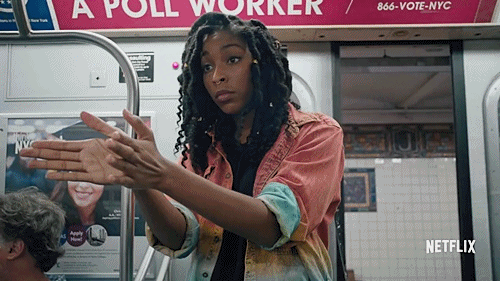
[gif from x]
I don’t think it’s unimportant, either, that Jessica Williams – a fine actress in this movie, entirely winning the screen – plays the heroine. By which I mean, I think it’s all the more radical that to play the romantic interest to gaze adoringly at rom-com’s Irish nerdboy Chris O’Dowd, the director/producers/writers picked a woman whose best-known appearances are in scathing condemnations of male privilege, white supremacy, and American patriarchal, racist, and just terrible norms in general. That such a woman is the new face – but I didn’t even get to talk about the fact that in a few scenes, Jessica J/W’s complexion is a little spotty, which made me (with a long history of struggling with the medical and psychological reality of being a teenager and then adult woman with terrible acne) want to cry with gratitude: this is what a heroine looks like?
Sure, Wonder Woman is fab, but damn I needed this representation so much – maybe more – than the superheroic, impervious demi-goddess from Themyscira. I needed a strong, self-loving, no-nonsense, tall, Black, not-quite-starving artist in Brooklyn, jamming with headphones in the concrete stairwell of her building, who proudly declares, “I’m freakin’ DOPE.”
I needed a new female coming-of-age story – especially in 2017 –, and, somewhat subtly but unquestionably, The Incredible Jessica James delivered.
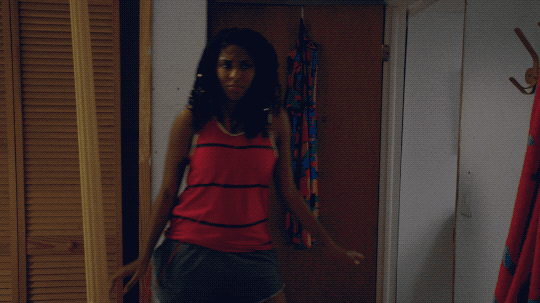
***
{** I use “women,” “men,” “male,” and “female” throughout this piece to refer mostly to the historical categories of those identities/concepts. I also want to be clear that I’m not trying to gloss over this film’s missteps; rather, I’m trying to celebrate its major, but possibly missable, wins. Lastly, I know that in German Bildungsroman means *novel* of development/maturation, not *film*. Don’t @ me.
Thanks to Jesse Rosenthal (JHU) for getting me thinking about the basic understanding of the Bildungsroman in such concise, formal terms. For the debate about male vs./and female Bildungsromane, see – to name just some –, Abel, Hirsch and Langland (eds.), The Voyage In: Fictions of Female Development (1983); Lorna Ellis, Appearing to Diminish: Female Development and the British Bildungsroman, 1750-1850 (1999); Rita Felski, Beyond Feminist Aesthetics: Feminist Literature and Social Change (1989); Franco Moretti, The Way of the World: The Bildungsroman in European Culture (1987); and Susan Fraiman, Unbecoming Women: British Women Writers and the Novel of Development (1993).
The Incredible Jessica James (2017), dir. and writer Jim Strouse; produced by Beachside Films/Netflix. S/o to casting, Kate Geller and Jessica Kelly. Thanks also to Springfield! Springfield! movie scripts for their transcription, which saved me time. }
#The Incredible Jessica James#Bildungsroman#women#coming of age#work#race#class#feminism#Jessica Williams#novel of development#narrative#films#movies#2017#mine#long read#female bildungsroman#heroine
7 notes
·
View notes